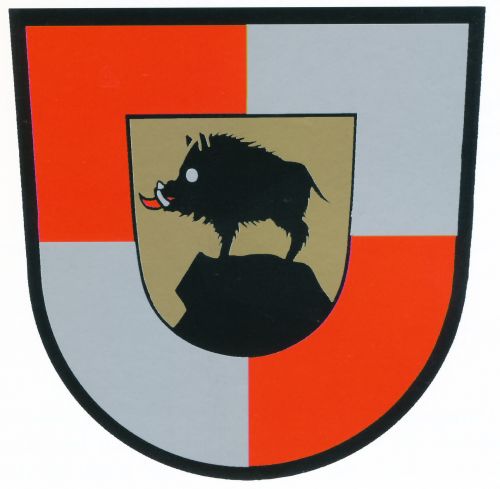Eberstein (Kärnten): Difference between revisions
Jump to navigation
Jump to search
Knorrepoes (talk | contribs) m (Text replace - "Österreich" />" />" to "Österreich" />") |
Knorrepoes (talk | contribs) m (Text replace - "[[Literature" to "{{media}} [[Literature") |
||
| Line 16: | Line 16: | ||
The small shield is canting, showing a boar (Eber) on a rock (Stein). The background of the shield is derived from the arms of the Lords of Eberstein, known from the 14th century. The arms were later regranted to their successor, Moritz Welzer in 1458. He used a boar as a crest and as a crest is not allowe din Austrian heraldry, the boar was placed in the shield. | The small shield is canting, showing a boar (Eber) on a rock (Stein). The background of the shield is derived from the arms of the Lords of Eberstein, known from the 14th century. The arms were later regranted to their successor, Moritz Welzer in 1458. He used a boar as a crest and as a crest is not allowe din Austrian heraldry, the boar was placed in the shield. | ||
{{media}} | |||
[[Literature]] : Deuer, 2006. | [[Literature]] : Deuer, 2006. | ||
Revision as of 21:00, 8 July 2014
| Heraldry of the World Civic heraldry of Austria - Österreichische Gemeindewappen |
EBERSTEIN
State : Kärnten
District : Sankt Veit an der Glan
Origin/meaning
The arms were officially granted on April 16, 1968.
The small shield is canting, showing a boar (Eber) on a rock (Stein). The background of the shield is derived from the arms of the Lords of Eberstein, known from the 14th century. The arms were later regranted to their successor, Moritz Welzer in 1458. He used a boar as a crest and as a crest is not allowe din Austrian heraldry, the boar was placed in the shield.
Contact and Support
Partners:
Your logo here ?
Contact us
© since 1995, Heraldry of the World, Ralf Hartemink 
Index of the site
Literature : Deuer, 2006.











